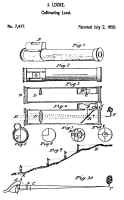|
 Article taken from "Backsights"
Magazine published by Surveyors Historical Society
Article taken from "Backsights"
Magazine published by Surveyors Historical Society
|
JOHN
LOCKE (1792 - 1856)
From
"The Makers of Surveying Instruments in America Since 1700" by Charles
E. Smart, 1962.
The Cincinnati Daily Gazette of Friday
July 11, 1856 on page 2 has the following announcement. "It is our painful
duty this morning to announce the death of Dr. John Locke, of this city.
Though his friends were not unprepared
for his death - for he has been lying sick a number of weeks - the sad
realization of their fears has thrown a deep gloom upon their spirits.
Dr. Locke was born in Fryeburg, Maine,
on the 19th February, 1792. His early life was spent at Bethel, Maine, where he
attended an academy, and distinguished himself by mechanical and scientific
attainments, rare for one of his years.
We understand that after graduating at
Yale College he was for some time a surgeon in the Navy. Unable here to pursue
as he wished, his scientific studies, he resigned and for a time employed
himself as a teacher in New England. Many of the old graduates of Dartmouth
College remember his visit as a teacher of Botany to that Institution.
Some thirty years since he moved to the
West an opened a school for young ladies at Lexington, Kentucky, which was
afterwards removed to, and continued in this city. In 1836 he accepted a chair
of Prof. Of Chemistry in this city which he filled with great honor to himself
and benefit to the Institution until his resignation some four or five years
since. During the past winter his health was very feeble. Some three months
since he was called to survey a coal mine in Western Virginia. He was here much
exposed to severity of weather and physical exertion.
His decease occurred at 8-1/2 A.M.
yesterday. Dr. Locke’s reputation as a scientific man was far-spread and
permanent.
Though particularly interested in
chemistry, he was at home in every department of physics and natural history,
and his investigations were always marked with patience and depth of research.
His principal scientific achievements were "Magnetical Researches"
extending over a large portion of the country, and continued for many years, and
the "Magneto-Astronomical Clock."
It is needless to praise either of
these. They have already placed their author in the front rank of American
Savans.
He was also widely known as a well
informed and accurate geologist, and his connection with the geological surveys
of Ohio, the mineral region of Lake Superior and Iowa, added much to their
value.
Dr. Locke was an eminently self-made
man. Our readers have probably seen the notice written by Seba Smith of Dr.
Locke’s early ingenuity. When at Bethal, Maine, someone’s watch was out of
order and no one in the town could fix it. At last it was handed to John Locke,
then a mere lad who, with his pen-knife took it to pieces, although he had never
seen the operation performed - cleaned it and put it together again.
Thus early did Prof. Locke display that
knowledge of horology, which in later years gave the world the
"magneto-astronomical clock" - a boon as valuable to practical, as
logarithms are to theoretical astronomy. Through thee whole of his life he
manifested the strong will and unflinching energy which carried him through the
privations of youth. To the scientific world of which he was so long a member,
to the numerous friends to whom he endeared himself by his kindness, to the
community, of which he was a bright ornament, and to his family who know as none
others can his worth as father and husband, the death of Professor Locke is an
irreparable loss."
 Dr.
Locke had trained two of his sons to help him put together various instruments
and pieces of scientific apparatus that he was continually designing. Dr.
Locke had trained two of his sons to help him put together various instruments
and pieces of scientific apparatus that he was continually designing.
He invented the electro-chronograph, a
surveyor’s compass which was patented on July 16, 1850 and a collimating level
which is being manufactured today with very little change from the original
patent which was granted on July 2, 1850. The early catalogs advertised it as
Locke’s Hand Level, today it is called Locke Hand Level."
| 